★★½
“Sai It Ain’t So…”
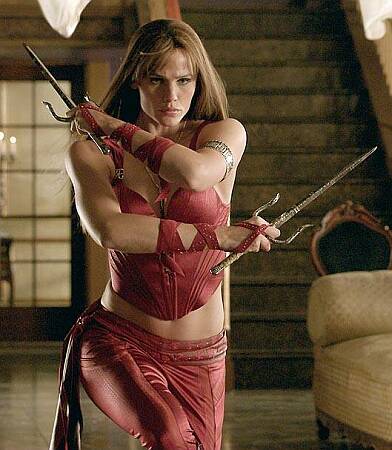 True story. A friend of ours has a job as an intern in Los Angeles, and coming round the corner at work one day, he literally bumped into Jennifer Garner. He immediately started apologising profusely (he’s an uber-nice kid, who wouldn’t say “Boo!” to a fly) but she wouldn’t have any of it and began cursing him out in the nastiest of ways. Garner finally stalked off, while he continued to apologise – just before vanishing, she turned round and gave him the finger. So now we know: Jennifer Garner = bitch.
True story. A friend of ours has a job as an intern in Los Angeles, and coming round the corner at work one day, he literally bumped into Jennifer Garner. He immediately started apologising profusely (he’s an uber-nice kid, who wouldn’t say “Boo!” to a fly) but she wouldn’t have any of it and began cursing him out in the nastiest of ways. Garner finally stalked off, while he continued to apologise – just before vanishing, she turned round and gave him the finger. So now we know: Jennifer Garner = bitch.
Despite this, it gives me no real pleasure to report on the failings of Elektra. It was a pleasant surprise, and says a fair bit about Daredevil, that the studio chose to pursue her character as a spinoff, rather than following up with a sequel. I hoped that they’d do a good job, capturing the dark passions and conflicts of the character, whose incarnation in works like Frank Miller’s Elektra: Assassin is truly memorable. [Interestingly, the screening was preceded by a trailer for another Miller adaptation, Sin City, which looks at least stylistically accurate] Unfortunately, what we have here is another shallow dumbing-down, offering little more than another straightforward good vs. evil battle.
The first issue is, of course, that Elektra died in Daredevil. No problem: we have a Yoda-like character, Stick (Terence Stamp), who can bring characters back from the grave. Yet this causes more problems than it solves: sure, Elektra’s back, but now, death, where is thy sting? Any threat to life is now no more inconvenient than in a video game: press X to continue. Anyway, after getting booted from Stick’s training camp in her second life, Elektra becomes a freelance assassin. However, when assigned to target a father (Visnjic, who remains miraculously just stubbly throughout) and his 13-year old daughter, Abigail (Prout), she suddenly has second thoughts.
This is kinda fortunate, since the pair turn out to be lynchpins in a battle between good (Stick and his allies) and evil. The latter are a group called The Hand, led by villain Roshi (veteran Cary Hiroyuki-Tagawa, from Mortal Kombat), who sends his son Kirigi (Lee) and his interesting-ability acolytes after Elektra and her wards. They can do stuff like make their tattooes come to life, kill things with a touch, or withstand shotgun blasts. Poor Elektra is just very, very good with weapons, which comes across as rather weak in comparison.
The aim is clearly to put Elektra across as an emotionally-scarred individual, who connects with Abigail, seeing herself in the teenager, and has enough baggage for an entire convention of shrinks. However, all we get in terms of her psychology are some clumsy flashbacks and a touch of pointless OCD which feels like it strayed in from Monk. Even after her agent (Colin Cunningham) both offers the trio shelter, then bravely stays behind to give them time to escape, his sacrifices don’t merit the slightest subsequent mention. Superheroes: they’re just so damn ungrateful.
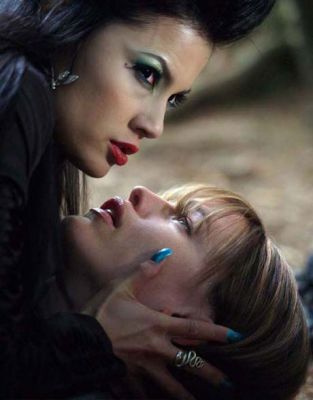 There is entertainment, mostly lurking in the background. A moment with impact sees Typhoid (Natassia Malthe), the girl with the poison touch, kiss Elektra; the pair fall to the ground surrounded by a shower of dying leaves. It feels almost like it could have been inspired by the work of Zhang Yimou (House of Flying Daggers), and is at least less obviously stolen than the “House of Flying Bed-Sheets” battle later on. It’s also interesting to see Mark Houghton as a chief bodyguard in the opening scene: he made his debut against Yukari Oshima in The Outlaw Brothers, back in 1987.
There is entertainment, mostly lurking in the background. A moment with impact sees Typhoid (Natassia Malthe), the girl with the poison touch, kiss Elektra; the pair fall to the ground surrounded by a shower of dying leaves. It feels almost like it could have been inspired by the work of Zhang Yimou (House of Flying Daggers), and is at least less obviously stolen than the “House of Flying Bed-Sheets” battle later on. It’s also interesting to see Mark Houghton as a chief bodyguard in the opening scene: he made his debut against Yukari Oshima in The Outlaw Brothers, back in 1987.
The fight scenes are actually pretty good too, though the editing occasionally borders on the incoherent, and there just aren’t enough of them. What about Roshi? After sending out his son, he vanishes entirely from the picture, leaving the result disappointingly like a Bond film where 007 never gets to meet Blofeld, and is left dispatching minions instead. I guess they were perhaps hoping to save that confrontation for a sequel, but having just seen the first week’s box-office returns (Elektra took in several million dollars less than Catwoman), doesn’t look like that’s going to happen anytime soon.
In terms of quality, this is probably about the same as the recent version of The Punisher, and that started from a lower point, the comics adapted there being basically a hyperviolent revenge fantasy for teenage boys. Frank Miller’s work on Elektra was truly for mature readers – in both the sense that its intricacies require a sophisticated mind to unpick, and the intense nature of its images. Instead, we get this PG-13 rated Elektra, that simply rolls out the usual comic-book cliches without sufficient enthusiasm or invention. It’s polished until the surface positively gleams, but is just a thin layer of precious gold, over a heart of basest metal.
We should have guessed: January is a bad time to release an action movie, and Garner’s absence from publicity (allegedly due to a viral infection or “nerve damage” – though that’s actually what our intern friend suffered at her hands) was another warning-sign. So was the fact Daredevil wasn’t that good. Regardless, it doesn’t bode well for a year where adaptations of comic-books come thick and fast, with February’s Constantine next. And after the failure of Catwoman, it unfortunately seems to be strike two for big-budget action heroines.
Dir: Rob Bowman
Stars: Jennifer Garner, Will Yun Lee, Kirsten Prout, Goran Visnjic
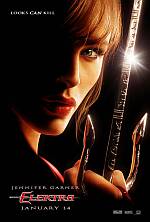
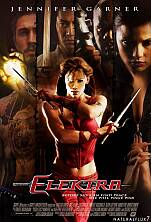
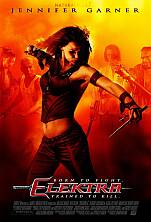
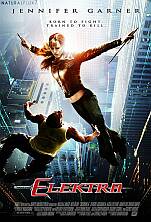

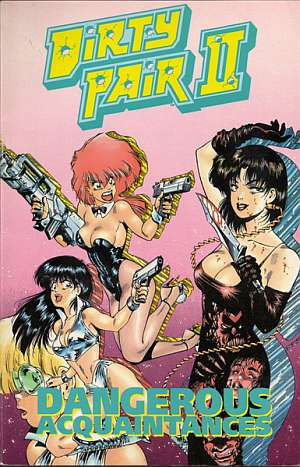 It’s been at least a decade since I read this – probably more – but it is still a thoroughly-enjoyable read, and a major improvement in just about every way (plotting, art, pacing, imagination and characterization) over the first stab. Of particular note is the solid way in which the two separate threads of the story are woven together. While on holiday, Kei and Yuri bump into Shasti, a former colleague of theirs in the WWWA. She was actually an android, who went rogue after a criminal’s personality was implanted into her, part of a (failed) experiment to see if it would help with his capture to have her think like him. She’s now apparently leading a group of “freedom fighters” who are planning to hijack a luxurious space-liner, crammed with VIPs and new technology. Has Shasti gone all political? Or, if not, what is she up to?
It’s been at least a decade since I read this – probably more – but it is still a thoroughly-enjoyable read, and a major improvement in just about every way (plotting, art, pacing, imagination and characterization) over the first stab. Of particular note is the solid way in which the two separate threads of the story are woven together. While on holiday, Kei and Yuri bump into Shasti, a former colleague of theirs in the WWWA. She was actually an android, who went rogue after a criminal’s personality was implanted into her, part of a (failed) experiment to see if it would help with his capture to have her think like him. She’s now apparently leading a group of “freedom fighters” who are planning to hijack a luxurious space-liner, crammed with VIPs and new technology. Has Shasti gone all political? Or, if not, what is she up to?




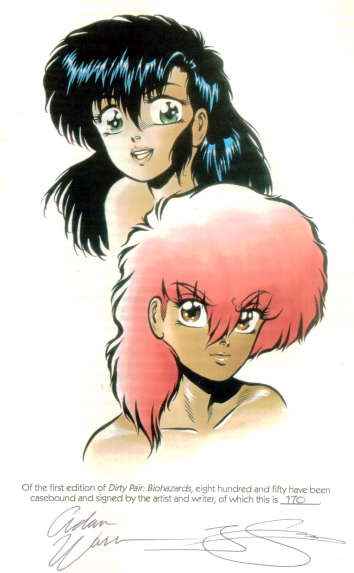 If you thought the novel was a quick read, I got through Biohazards during lunch, and that’s only with 30 minutes. Still, being a comic-book, we must cut it some slack, though I can’t say I find action (and there’s a
If you thought the novel was a quick read, I got through Biohazards during lunch, and that’s only with 30 minutes. Still, being a comic-book, we must cut it some slack, though I can’t say I find action (and there’s a 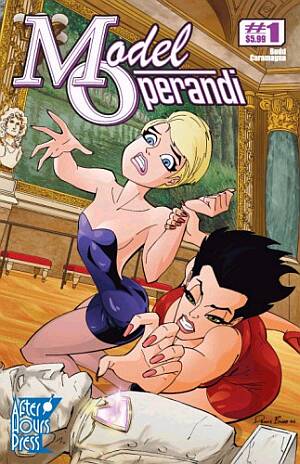
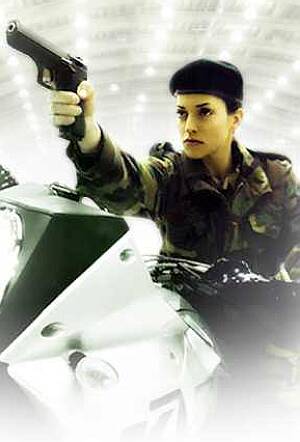 This SciFi Channel original movie is based on a comic-book series, but makes some radical changes to the storyline, though the basic idea is intact: a woman becomes immune to injury after the usual mysterious something happens to her [radioactive spider bite, barrel of toxic waste – the usual graphic novel contrivances, in other words]. In the comic, she was an undercover cop; here, she is a Special Forces soldier in Chechnya who is exposed to an experimental biological agent. Naturally, she subsequently finds herself much sought after, by both good and bad factions, since she’s the first to survive the treatment.
This SciFi Channel original movie is based on a comic-book series, but makes some radical changes to the storyline, though the basic idea is intact: a woman becomes immune to injury after the usual mysterious something happens to her [radioactive spider bite, barrel of toxic waste – the usual graphic novel contrivances, in other words]. In the comic, she was an undercover cop; here, she is a Special Forces soldier in Chechnya who is exposed to an experimental biological agent. Naturally, she subsequently finds herself much sought after, by both good and bad factions, since she’s the first to survive the treatment.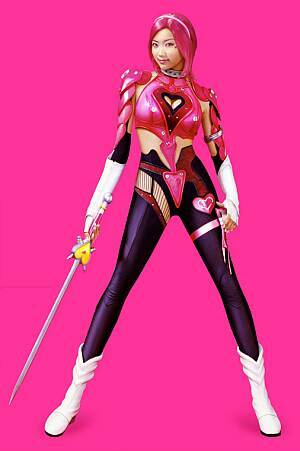 The picture on the right probably does a better job of explaining what Cutey Honey is about than I ever could; part-girl, part nano-technology, rebuilt post-car crash with superpowers and some interesting costumes, which require fuelling through junk food. After her uncle is kidnapped by the evil Sister Jill (Sakai) and his/her/its minions – Jill is part tree, and has also been kidnapping women en masse, in order to drain their lifeforce – only Cutie (Sato) can save the day, assisted by a no-nonsense policewoman (Ichikawa) and a journalist who, basically, acts as “Exposition-San” (Murakami).
The picture on the right probably does a better job of explaining what Cutey Honey is about than I ever could; part-girl, part nano-technology, rebuilt post-car crash with superpowers and some interesting costumes, which require fuelling through junk food. After her uncle is kidnapped by the evil Sister Jill (Sakai) and his/her/its minions – Jill is part tree, and has also been kidnapping women en masse, in order to drain their lifeforce – only Cutie (Sato) can save the day, assisted by a no-nonsense policewoman (Ichikawa) and a journalist who, basically, acts as “Exposition-San” (Murakami). True story. A friend of ours has a job as an intern in Los Angeles, and coming round the corner at work one day, he literally bumped into Jennifer Garner. He immediately started apologising profusely (he’s an uber-nice kid, who wouldn’t say “Boo!” to a fly) but she wouldn’t have any of it and began cursing him out in the nastiest of ways. Garner finally stalked off, while he continued to apologise – just before vanishing, she turned round and gave him the finger. So now we know: Jennifer Garner = bitch.
True story. A friend of ours has a job as an intern in Los Angeles, and coming round the corner at work one day, he literally bumped into Jennifer Garner. He immediately started apologising profusely (he’s an uber-nice kid, who wouldn’t say “Boo!” to a fly) but she wouldn’t have any of it and began cursing him out in the nastiest of ways. Garner finally stalked off, while he continued to apologise – just before vanishing, she turned round and gave him the finger. So now we know: Jennifer Garner = bitch. There is entertainment, mostly lurking in the background. A moment with impact sees Typhoid (Natassia Malthe), the girl with the poison touch, kiss Elektra; the pair fall to the ground surrounded by a shower of dying leaves. It feels almost like it could have been inspired by the work of Zhang Yimou (House of Flying Daggers), and is at least less obviously stolen than the “House of Flying Bed-Sheets” battle later on. It’s also interesting to see Mark Houghton as a chief bodyguard in the opening scene: he made his debut against Yukari Oshima in The Outlaw Brothers, back in 1987.
There is entertainment, mostly lurking in the background. A moment with impact sees Typhoid (Natassia Malthe), the girl with the poison touch, kiss Elektra; the pair fall to the ground surrounded by a shower of dying leaves. It feels almost like it could have been inspired by the work of Zhang Yimou (House of Flying Daggers), and is at least less obviously stolen than the “House of Flying Bed-Sheets” battle later on. It’s also interesting to see Mark Houghton as a chief bodyguard in the opening scene: he made his debut against Yukari Oshima in The Outlaw Brothers, back in 1987.



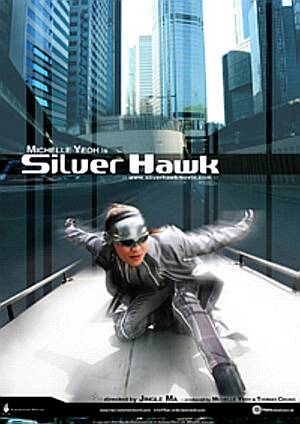 There’s no doubt about the aesthetic they’re aiming for here; heroine with secret identity, sneering evil nemesis, gadgets, etc. Take a Marvel comic from the 60’s, transplant it to the modern Far East, and there you are. Indeed, this period is apparently where SilverHawk originated; unfortunately, the makers failed to learn from similar failures such as The Avengers, The Mod Squad and Wild Wild West, and the results are lacklustre.
There’s no doubt about the aesthetic they’re aiming for here; heroine with secret identity, sneering evil nemesis, gadgets, etc. Take a Marvel comic from the 60’s, transplant it to the modern Far East, and there you are. Indeed, this period is apparently where SilverHawk originated; unfortunately, the makers failed to learn from similar failures such as The Avengers, The Mod Squad and Wild Wild West, and the results are lacklustre.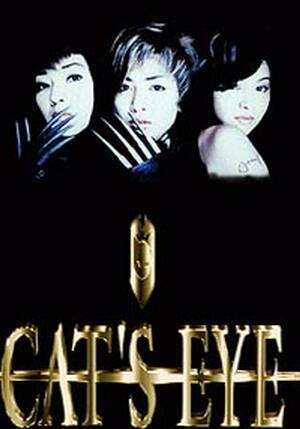 Despite an overall rating that is only mildly above average, when this is good, it is
Despite an overall rating that is only mildly above average, when this is good, it is 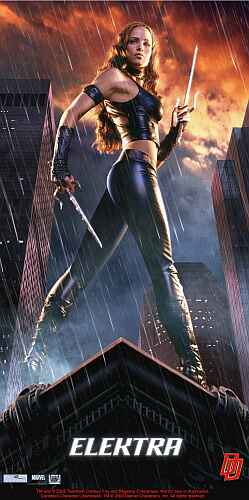 While 2003 has been touted as the Year of the Comic-book Movie, those centred around heroines have been notable by their absence. Sure, X-Men 2, League of Extraordinary Gentlemen and Daredevil have then in supporting roles, but going by the example of the last-named, anyone expecting much is likely to be sorely disappointed. Elektra, one of the toughest, deepest, most twisted characters in comics history – at least in the Bill Sienkiewicz/Frank Miller incarnation – was reduced to little more than a simplistic sidebar of little relevance. Credit to Jennifer Garner for doing what she could, but it’s safe to say that we’re not awaiting the touted Elektra spinoff with anything more than a “that’s nice” level of anticipation.
While 2003 has been touted as the Year of the Comic-book Movie, those centred around heroines have been notable by their absence. Sure, X-Men 2, League of Extraordinary Gentlemen and Daredevil have then in supporting roles, but going by the example of the last-named, anyone expecting much is likely to be sorely disappointed. Elektra, one of the toughest, deepest, most twisted characters in comics history – at least in the Bill Sienkiewicz/Frank Miller incarnation – was reduced to little more than a simplistic sidebar of little relevance. Credit to Jennifer Garner for doing what she could, but it’s safe to say that we’re not awaiting the touted Elektra spinoff with anything more than a “that’s nice” level of anticipation. I usually start watching this in a sense of disbelief, since it’s certainly not the most immediately convincing of movies. However, there’s a point near the middle which has in quick succession an amazing action sequence and two revelations, one touching, one tragic, and I realise that I am, yet again, utterly buying into the characters, storyline and setting. Disbelief simply ceases to be an option, and by the end, I know why this is among my all-time favourites, not just in the action heroine genre, but among all cinema.
I usually start watching this in a sense of disbelief, since it’s certainly not the most immediately convincing of movies. However, there’s a point near the middle which has in quick succession an amazing action sequence and two revelations, one touching, one tragic, and I realise that I am, yet again, utterly buying into the characters, storyline and setting. Disbelief simply ceases to be an option, and by the end, I know why this is among my all-time favourites, not just in the action heroine genre, but among all cinema.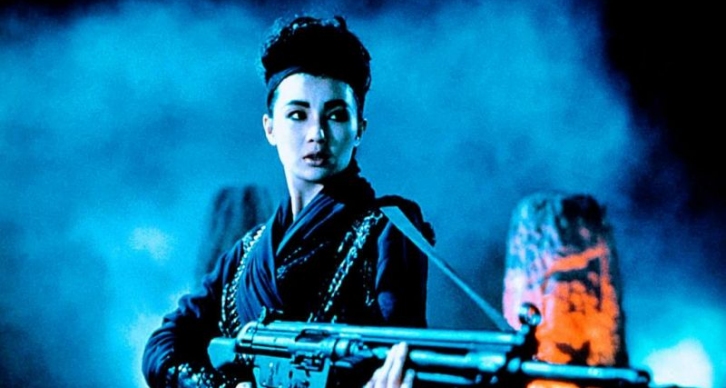
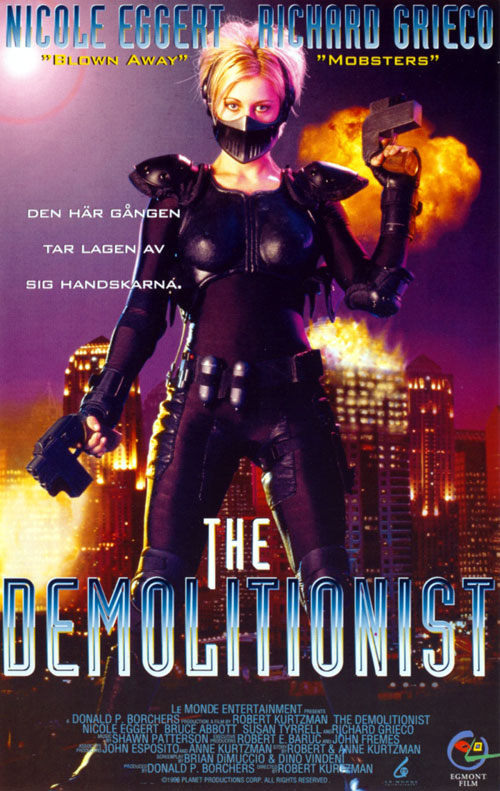
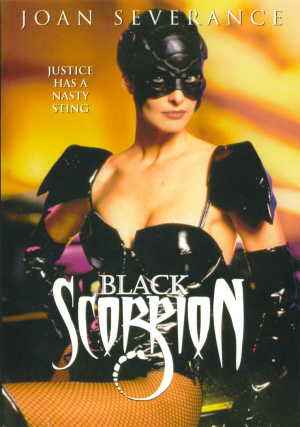 Roger Corman is a man without shame – and that’s in no way intended as an insult. He simply utilises any resource to the best of its ability, as is shown by the
Roger Corman is a man without shame – and that’s in no way intended as an insult. He simply utilises any resource to the best of its ability, as is shown by the 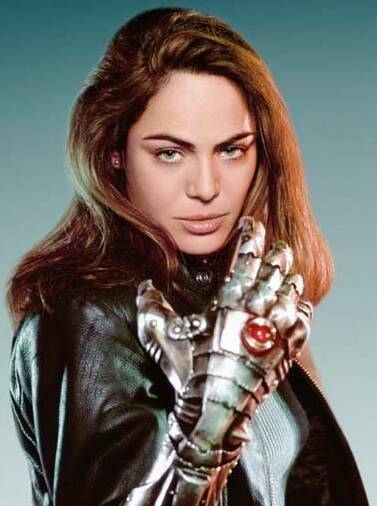 Much as in the first season, the second series of Witchblade brushed against greatness. Unlike the first, where you can point at the final episode as the key weakness, this time round it is a chronic rather than acute malaise that prevents it from getting the seal of approval. When it was great, it was fabulous – it just seemed that for every full, satisfying episode, there was a lame clunker to compensate. Particularly at the start of the season, there seemed to be precious little imagination on view.
Much as in the first season, the second series of Witchblade brushed against greatness. Unlike the first, where you can point at the final episode as the key weakness, this time round it is a chronic rather than acute malaise that prevents it from getting the seal of approval. When it was great, it was fabulous – it just seemed that for every full, satisfying episode, there was a lame clunker to compensate. Particularly at the start of the season, there seemed to be precious little imagination on view.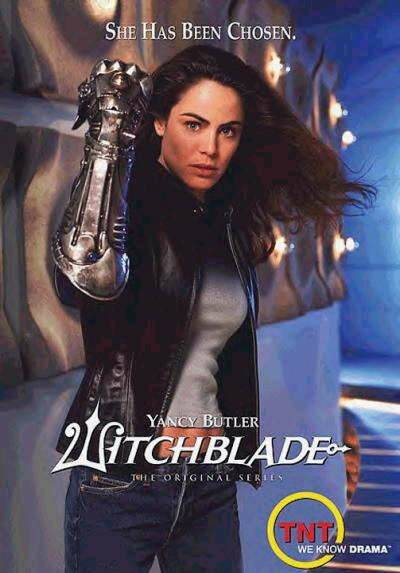 The finale, Ubique, also has to rate highly, for sheer perversity at the very least – Nottingham reaches new levels of creepiness in his final scenes with Lucrezia. Throw in a kicking soundtrack (Lords of Acid!), some spectacular deaths, and we’ll forgive a central plot device teetering curiously close to the main premise of feardotcom, which opened in cinemas the very same week. Among the interesting themes on view are the way both Pezzini and Nottingham both struggle to come to terms with the loss of their fathers, albeit temporarily in the latter’s case. This may be linked to one of the unresolved issues carried forward; who is the guy with wavy grey hair who always seems to be lurking round Sara? Indeed, the whole Nottingham/Pezzini relationship had perhaps more depth than any other in the show; veering between love, hate and obsession, with never a dull moment.
The finale, Ubique, also has to rate highly, for sheer perversity at the very least – Nottingham reaches new levels of creepiness in his final scenes with Lucrezia. Throw in a kicking soundtrack (Lords of Acid!), some spectacular deaths, and we’ll forgive a central plot device teetering curiously close to the main premise of feardotcom, which opened in cinemas the very same week. Among the interesting themes on view are the way both Pezzini and Nottingham both struggle to come to terms with the loss of their fathers, albeit temporarily in the latter’s case. This may be linked to one of the unresolved issues carried forward; who is the guy with wavy grey hair who always seems to be lurking round Sara? Indeed, the whole Nottingham/Pezzini relationship had perhaps more depth than any other in the show; veering between love, hate and obsession, with never a dull moment.